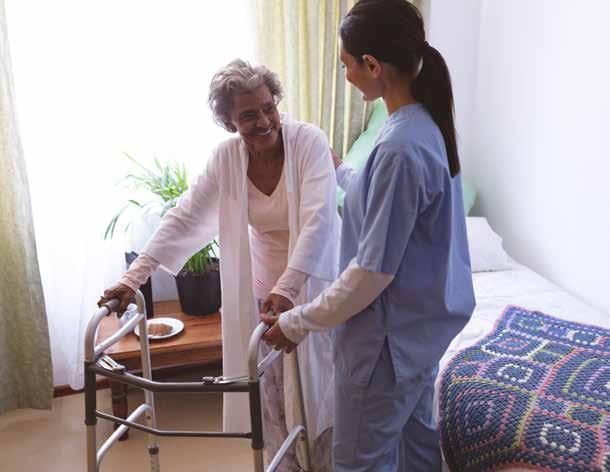
4 minute read
Nursing Home Administration: Care, Compassion and Competence
By Kellie Baker, MSW
More people are spending time in nursing homes and assisted-living facilities. If you have a friend or family member in one of these places, make sure the administrator is competent, caring, and compassionate. These are the signature qualities of an outstanding administrator, staff, and facility.
Advertisement
I spent 20 years of working for a national nonprofit association in Washington, DC that represented low-income Americans. Then, I decided to pursue my passion and work with the elderly in a healthcare setting. This desire was ignited by observing my grandmother receive home healthcare services. I was moved by the care and concern the staff showed, as well as the way they connected with my grandmother and family. This is something I felt called to do.
I began to explore the field and ways to enter it, knowing I lacked experience and connections. I went online and researched how to enter the healthcare industry, as a midcareer professional. I discovered that I could volunteer, as a long-term care ombudsman, to find out if I would enjoy working in this environment. Soon thereafter, I approached a nearby senior healthcare facility and volunteered as an ombudsman for eight months.
During that time, the facility’s Executive Director met with me and explained that she was a licensed preceptor (trainer) for the State of Virginia; and, that I should contact the Virginia Board of Long-Term Care Administrators about becoming a nursing home administrator. She offered to host my training at her facility, which included skilled nursing, assisted-living, and memory care services. I applied to become an Administrator-in-Training (AIT) through the Virginia Board of Long-Term Care Administrators. The Board approved my application credited me for my Master of Arts degree in Social Work (MSW), specializing in gerontology, as well as my 20 years of experience in management. They determined that my AIT program would be extended over a six-month period, instead of the full two-year term.
Upon completion of the AIT program, I worked as an Associate Executive Director (AED) at a local assisted-living facility. I assisted the Executive Director with the oversight and leadership of dining services, activities, resident care, sales and marketing, business office, maintenance, housekeeping, and other departments within the community. In addition to managing daily operations, I became knowledgeable about governmental regulatory and administrative requirements related to health, safety, fiscal compliance, and a host of other areas. I also learned to be a more effective advocate for residents and their families by participating in monthly “Town Halls” and working with state and local governmental officials.
Most of my most memorable experiences evolve around daily interactions with the residents and their involvement with activities in the community. I am keenly aware of their concerns and I make it my mission to address their issues. Because dining is a popular topic among residents, we created a “Dining Experience Team,” which meets monthly with residents to discuss their issues and ideas. During these meetings, the cooks on the dining team share their recipes and discuss menu selections residents might enjoy. These menu selections are presented to the residents at the monthly Dining Experience Meeting, where they vote to add them to their monthly menus. This allows our residents to have a voice in their meal selections. This process is repeated each month, which allows residents to add an additional menu selection each month.
During this time of the COVID-19 pandemic and infection control, maintaining a weekly schedule of the cleaning of durable medical equipment (DME) is critical. The maintenance department provides a schedule of its cleaning plans and protocols to the Administrator every week. COVID-19 has hit nursing homes and senior citizens especially hard. So, this is one of the most important parts of our routine.
Good communication is of utmost importance. The Administrator and management teams send weekly emails to the residents’ families and/or responsible parties to update them on the activities within the community. For transparency, we frequently attach photos of team members in service. Although we offer photo and video consent forms to our residents and their families, our preference is to only submit pictures of our team members serving our residents in our weekly emails.
In conclusion, if you have a family member or friend in a nursing home or assisted living facility, rest assured, they are being cared for by competent and compassionate staff. Let the administrators and staff know that you are concerned and committed to ensuring your resident is receiving the maximum benefit from their stay. Finally, let them know how much you appreciate them and the job they are doing. ___________________________________
Kellie Baker is a licensed Nursing Home Administrator in the Washington, DC metro area with seven years of experience. Prior to entering this field, she served as a senior executive for a national association serving community action organizations. Ms. Baker holds a Bachelor’s degree in communications and Masters of Social Work (MSW) in gerontology, along with several professional certifications. You can reach Kellie Baker by email at cambaker1969@ yahoo.com.









